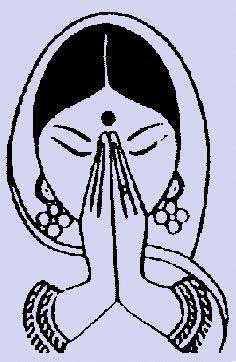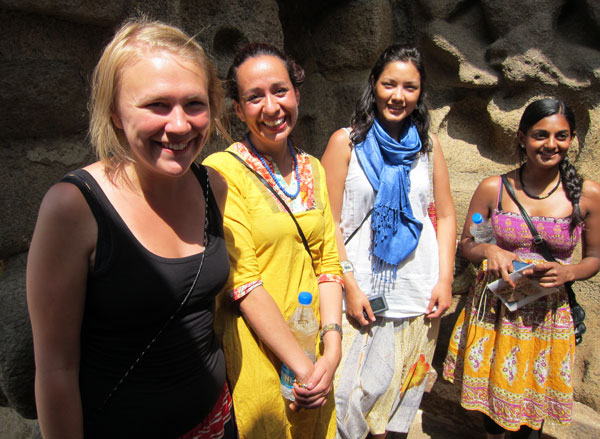SWEDISH SOUTH ASIAN STUDIES NETWORK
Department of Educational Science with an emphasis on Humanities and Social Science (UHS), Stockholm University
 Postal
address: Institutionen för utbildningsvetenskap med inriktning mot humaniora och samhällsvetenskap (UHS),
Stockholm University, SE-106 91 Stockholm
Postal
address: Institutionen för utbildningsvetenskap med inriktning mot humaniora och samhällsvetenskap (UHS),
Stockholm University, SE-106 91 Stockholm
Visiting address: O-huset, Konradsbergsgatan 5 A
Web page: http://www.uhs.su.se/
In January 2008, the Stockholm Institute of Education merged with Stockholm University. The new Dept. of Educational Science with an emphasis on Humanities and Social Science (UHS) has its roots in the former Dept. of Teaching processes, Communication and Learning, that used to exist within Stockholm Institute of Education.
South Asia related education in the Dept. of Teaching processes, Communication and Learning:
From 1993 the department every year arranged an elective 20 credits
specialization programme on Global Education, led by Dr. Jim Walch. The programme, open to
all admitted students to the Teachers traing programme at the Institute,
consisted of an intensive 10 weeks field work study (called The
Changing South) in Tamil Nadu, India, and a 10 weeks follow-up
course in Sweden afterwards. More than 700 students passed the
programme through the years.
Dr. Walch was also the department’s representative
in the so-called ITERMS
(International Teacher Education and Research Multidisciplinary Support)
International Centre. The main task of this
Centre was to meet the increasing
demands for commissioned education and research from third world countries
as well as from new member states of the European Union.
 |
| Students from Stockholm University during the 2011 ”Changing India and Ourselves” course, here at Mahabalipuram. Photo: Lars Eklund |
In 2006, the programme was converted into a 10 credits (15 ECTS)
course titled ”Changing India and Ourselves”, led by Kristina Lanå, International representative at the department.
During the Spring 2007 the course ran from January to March. Just like before,
the course consisted of two parts, first five weeks field studies in
Tamil Nadu, India, where the students should confront, analyse and
reflect upon the various patterns of poverty and domination that can
be found in the South and in the relation to the richer parts of the
world; and then five weeks literature
studies and seminars in Sweden.
The partner institutions
in Tamil Nadu were St. Joseph’s College in Trichy,
Loyola College in Chennai, N.K. Thirumala Chariar National College
of Education for Women (NKTNCE) in Chennai, Madras Institute
of Development Studies (MIDS), and the Village Community Development
Society, VCDS, in Vellakulam.
The course again has run every year since 2008 (January–March). It is now led by the two lecturers Annika Bergsland, and Stina Eriksson, both from UHS. The latest course runs during early Spring 2011. Last date for applications was 15 October 2010. More
information. ![]()
In February 2006 Jim Walch received a SASNET
planning grant for a project called ” Teacher
education in the field: Facilitating thesis work in South India.” The
project aimed at formalising relationships with educational institutions
in Tamil Nadu, in order to facilitate for Swedish students to do their
didactic theses and project work in India, and lead to having more
teachers in the future with a knowledge of the South. Two members of
the ITERMS team visited South India in October-November 2006 in order
to strenghten and further develop existing cooperation and form new
alliances.
Project abstract: This is a network planning project
with the specific goal of formalizing relationships in order to enable
an expected large number of students from the Stockholm Institute of
Education, Sweden’s largest teacher training institution, to carrying
out didactical research projects in education at the senior thesis and
Masters level and to prepare the way for similar field work in a projected
European Joint Masters in Global Education. The motivation for this project
is to help correct the bad state of teaching about the South in general
and South Asia in particular, in schools. Over the past fifteen years,
about 700 students and teachers have participated in undergraduate courses
in South India organized by the SIE. This will continue and the present
project is to expand and strengthen resources so that other categories
of students can do meaningful work in the field. We plan to expand the
number of academic and NGO partners and to sign contracts so that students
from the SIE will receive proper guidance. The newly formed centre at
the SIE, ITERMS (see information above) is the
focal point for this type of work.
As a result from the SASNET funded journey, MoUs were signed with
Loyola College and NKT
National College of Education for Women (NKTNCE, affiliated to the University
of Madras), both in Chennai. Loyola College, South India’s leading
institution, is starting teacher education from the academic year 2007-08.
Several new areas of cooperation were discussed with NKTNCE. One is in
the area of Early Childhood Education, an area of SIE expertise. Another
is a three part cooperation around curriculum development in the field
of low-vision(special education together with the NIVH (National Institute
for the Visually Handicapped , South India regional office in Poonamalai).
Both the NIVH and NKTNCE have assumed pioneering roles in this area in
teacher educatuion in South India, along with the Ramakrishna College
in Coimbatore. ![]()
Contact was established with another institution for teacher education
in Chennai, Stella Maris, one of the largest of its kind in South India,
also affiliated to the University of Madras.
Several discussions and meetings were also held with the Social
Watch
– Tamilnadu research group, stationed in Choolamaidu in Chennai.
Just like SIE, this organisation is constantly under pressure to council
and advise young researchers from Europe (and the USA), and therefore
a more permant cooperation to deal with this was discussed.
Another key component in the strategy to keep the SIE courses to Tamil
Nadu going in spite of a major reorganisation that currently takes
place regarding teachers training in the Stockholm area, is
to involve other International actors. One is Canterbury
Christ Church University, UK, where a similar course has been created,
and another possible partner for cooperatyion is the teacher education
at Blaagaard Seminarium, a teachers training
college in Copenhagen, Denmark. Such International collaboration may possibly
mean that the undergraduate India program can be saved. ![]()
Research connected to South Asia
Dr. Jim Walch has been working on a research project called ”Encountering India – A Study in Cross-Cultural relearning”, based on experiences from running of the course ”The Changing South” since 1994. The project deals with how people from Europe react when confronted with an Indian reality, how preconceived notions and perspectives are turned upside down. He tries to expose why the European perspectives are so limited and culturally coloured by Orientalist ideology, congenially described by Edward W. Said in his book ”Orientalism – Western Conceptions of the Orient”. The project would result in a book supposedly published in the Fall of 2004. More information on the research project (as a pdf-file).
Project abstract: Why do we call the spot on the forehead of an Indian woman a ”caste mark” when this is not a mark of caste? Why do we believe that all cows in India are holy for everyone? And read in the newspaper that the export of beef from India is a growing and important enterprise. Where did we learn these things? More importantly, why have we learnt this? What more preconceptions of the ”Oriental Other” do we harbor, perhaps not consciously? How are these preconceptions reproduced and how can we deconstruct and reconstruct our orientalist conceptualizations? Can these preconceptions and attitudes be made visible through a close encounter? These are the questions Dr Walch is working with in his research project.
SASNET - Swedish South Asian Studies Network/Lund
University
Address: Scheelevägen 15 D, SE-223 70 Lund, Sweden
Phone: +46 46 222 73 40
Webmaster: Lars Eklund
Last updated
2011-03-21
